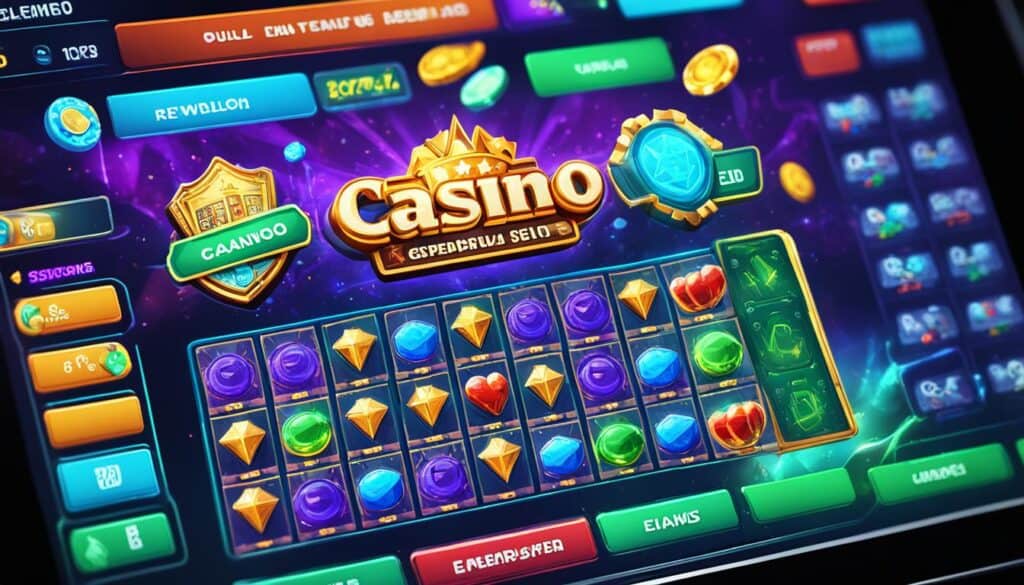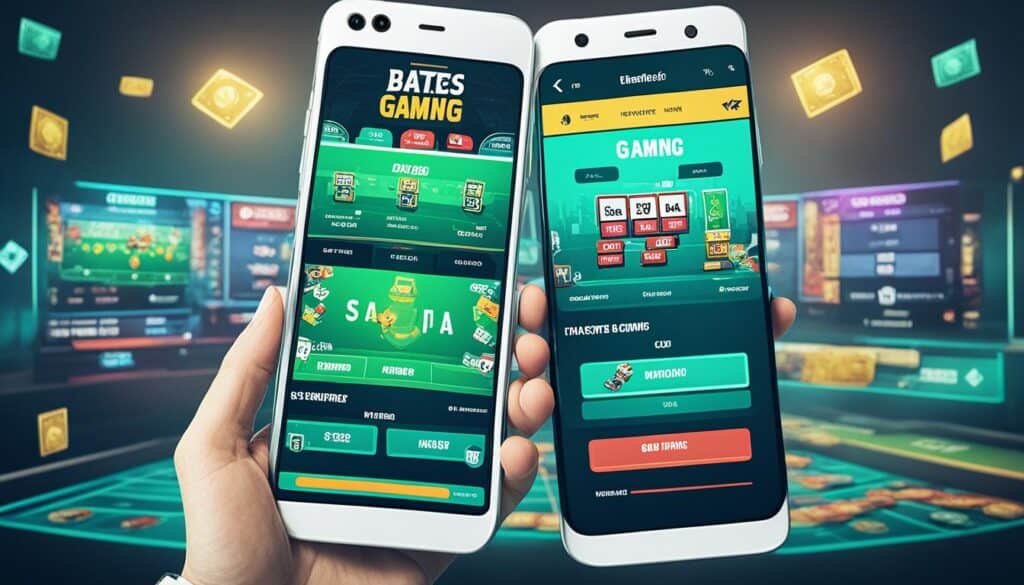The phenomenon at the intersection of gambling and gaming is reshaping the contours of digital entertainment. As these two worlds converge, the boundaries of play and pay become increasingly intertwined, giving rise to new entertainment dynamics. The rapid ascendancy of social gaming platforms has not only transformed the way people connect and engage with games but also blurred the lines between casual entertainment and the enticing thrill of the gamble.
This convergence has significant implications for how society perceives and interacts with games. While on one hand, it affords innovative forms of digital recreation, on the other, it heightens the necessity to comprehend and address the issues of disordered gambling. The blending of skill and chance, alongside virtual rewards and real stakes, creates a complex tapestry that requires careful consideration to understand its full impact on individuals and communities across the United States.
Understanding the Gambling and Gaming Intersection

The rise of digital entertainment has brought forward the significant convergence of video gaming and betting, a phenomenon reshaping the user experience and blurring the traditional lines distinguishing gambling from gaming. As these worlds intertwine, it becomes critical to explore not only how gaming and gambling are merging but also the inherent differences between these activities. This insight plays a crucial role in addressing the subtle introduction of gambling elements in video games that may impact vulnerable audiences.
Defining the Convergence of Play and Pay
At its core, the convergence of video gaming and betting is defined by the integration of risk-based monetary elements within games that were traditionally meant for entertainment. This integration has led to a new genre of digital experiences where players engage in mechanisms that mirror real-life betting.
- Inclusion of wagering mechanics in strategy and role-playing games
- Implementation of casino-style minigames within larger game narratives
- Real money purchases of virtual items with the chance of enhancing gameplay
While these integrations can offer enhanced gameplay and introduce new revenue channels for developers, they also create a space where gambling and gaming coexist without clear distinction, presenting challenges in defining user experiences and regulatory compliance.
Psychological Underpinnings of Betting Mechanics in Video Games
The psychological appeal of betting mechanics in video games lies in their capacity to trigger a dopamine response similar to traditional gambling. However, unlike conventional betting environments, these mechanics are often presented in contexts that are accessible to a younger, more impressionable audience, many of whom are at an age where their understanding of risk and reward is still developing.
- Instant gratification via in-game rewards and loot boxes
- The thrill of chance in obtaining rare virtual goods
- Social status and peer recognition tied to virtual achievements
Considering these factors, it’s vital to form a comprehensive understanding of how these gambling elements can affect player behavior, especially among younger gamers. Proper education and transparent communication about the risks and rewards of such mechanisms can empower players to maintain a healthy relationship with their gaming experiences, balancing entertainment with responsible use.
Gamification in Online Casinos: When Gaming Meets Gambling

The gambling and gaming industry trends are evolving rapidly, ushering in a new wave of engagement with the gamification of online casinos. This phenomenon merges the excitement of video games with the thrill of gambling, crafting an entirely novel and immersive gaming experience.
As innovators seek to capitalize on the overlap between gambling in video games and traditional casino betting, they are leveraging cutting-edge technology to create a symbiotic environment where players can enjoy the familiarity of gaming within the realm of digital wagering. These developments lead to a paradigm shift, redefining user interactions with gambling platforms.
- Introduction of reward systems mimicking video game achievements.
- Inclusion of storylines and avatars to cultivate a sense of persona.
- Integration of leaderboards to foster competitive play amongst participants.
- Utilization of virtual reality to heighten the sensation of in-game presence.
Such fusion is not merely a testament to innovation in the sector; it indicates a broader transformation in how people consume and engage with gambling content—evolving from passive participation to active and interactive entertainment. The adoption of gamified features within online casinos perhaps signals an industry-wide transition aiming to deliver more intriguing, engagement-focused experiences to users worldwide.
- Exploration of user motivations for engaging in gamified gambling.
- Insights into how gamification strategies increase user retention.
- Analysis of the psychological impact of immersive gambling experiences.
Ultimately, the union of gambling mechanics with game-like elements heralds a new era for the casino environment, presenting endless opportunities for growth and innovation. As the industry continues to evolve, it becomes imperative to understand these changes’ impact on consumer behavior and the overall landscape of digital entertainment.
Loot Boxes and Gambling Debates: A Controversial Synergy

The emergence of loot boxes in video games has acted as a catalyst for widespread gambling debates, eliciting a complex blend of emotional and regulatory responses. This surge in interest has turned the spotlight onto the broader implications of these game mechanics, particularly as they pertain to legal and ethical dimensions. Critics suggest that the random nature of loot box rewards bears a strong resemblance to gambling, thereby warranting legislative attention and potential regulatory action.
Legislative Scrutiny and Consumer Awareness
In several jurisdictions, the legal implications of betting in video games have come under intense legislative scrutiny. Government officials and regulatory bodies are pondering profoundly on the nature of loot boxes and their place within the current framework of gambling regulations. This analysis aims to discern if these pervasive game features should legally be considered a form of gambling due to the involvement of real-world money and the reliance on chance for obtaining rewards.
Consumer awareness campaigns have galvanized the public, drawing attention to the equivalent strategies that loot boxes and traditional gambling share. Concerns have risen regarding how these systems may entice particularly younger players, normalizing betting behaviors at an impressionable age. The resulting discourse is shaping the way societies view the interaction between gaming, entertainment, and responsible gambling.
Comparing Loot Boxes to Traditional Gambling Practices
When comparing loot boxes to traditional gambling practices, several commonalities emerge; both entail a financial stake and an element of chance. However, they diverge in their delivery systems—loot boxes are embedded within the digital narratives of games, often making them more accessible to a wider, sometimes underage, audience. This placement thus raises numerous ethical considerations surrounding gambling in video games, spurring calls for clear-cut policies to ensure player protection.
- Assessment of the psychological draw of loot box mechanics resembling slot machines
- Examination of the monetary valuation and trading ecosystems surrounding loot box contents
- Discussion of the role of game publishers and developers in self-regulating this contentious feature
The ongoing debates thus advocate for a balanced approach, where the thrill of in-game rewards can coexist with robust safeguards to prevent irresponsible gambling habits, especially amongst youth. Balanced regulations could promote an ecosystem where entertainment and player welfare are not mutually exclusive, but harmoniously integrated.
How Gaming and Gambling Are Merging in Modern Entertainment

The landscape of digital entertainment is experiencing a paradigm shift as the future of game-based betting takes shape. The evolution of betting in video games marks a significant departure from traditional gaming, where the primary objective was entertainment without financial stakes. In the contemporary scene, however, the integration of gambling principles into video games is not merely an experiment but a new formula for enhanced user engagement and substantial monetization in gaming.
As we delve into this phenomenon, it’s critical to consider the balance between the creativity of game design and the pragmatism of gambling vs gaming regulations. The transformation feels most palpable when observing games with embedded betting features, whose popularity among players also presents various challenges and opportunities for game developers and regulatory bodies alike.
Case Studies: Video Games with Embedded Betting Features
Analyzing case studies from titles that have embraced in-game betting mechanisms sheds light on the intricacies of this intricate merger. These games often feature elements such as skins betting, where virtual in-game items can be wagered or traded, and casino-style mini-games that allow for real-world value transactions within the gaming environment.
The Impact on Audience Engagement and Revenue Models
The presence of betting features within games has a direct correlation with audience engagement. Players are more invested when there is real value at stake, thus extending playtime and potentially increasing revenue. This attraction is a double-edged sword; it necessitates a discussion on the ethical implications and the need for transparent monetization practices. Ultimately, this evolution points towards a future where the lines between gaming and gambling will continue to blur, crafting a new heritage for digital gaming entertainment.
The Impact of Gambling Elements in Popular Video Games

The rise of gambling features in gaming has led to a significant shift in user engagement, with developers constantly exploring ways to incorporate these elements into popular titles. However, the impact of gambling elements in video games extends beyond mere engagement, touching on varied psychological effects and potential social and financial repercussions for players.
While designed to introduce new ways for players to interact with games, gambling elements raise concerns about the long-term psychological effects of gambling in games. They also blur the lines between gaming for entertainment and engaging in potentially risky gambling behaviors.
Common in-game gambling elements such as loot boxes, which resemble gambling mechanics, have become a lucrative part of the gaming industry’s revenue strategy. Yet, they come with complex challenges:
- Presence of microtransactions and their reliance on player spending habits
- The allure of chance-based rewards and their relation to problem gambling behaviors
- Potential normalization of gambling among younger players who form a significant portion of the gaming community
Continued engagement and financial investment in games by users are partly fueled by these gambling features. But at the same time, concerns have been raised about the establishment of gambling-like routines, especially in children and adolescents, who may be vulnerable to developing gambling disorders. An understanding of the delicate balance between enhancing user engagement and safeguarding against problematic behaviors is becoming increasingly crucial in the world of game development.
A balanced response from both developers and regulators is necessary to mitigate the risks associated with these features while still ensuring an entertaining gaming experience. Reflecting on the incorporation of gambling elements in games will not only better protect players but also help maintain the integrity of the gaming industry.
Esports and Betting: A New Frontier in Online Gaming

The advent of professional gaming competitions, known as esports, has dramatically transformed the online gaming landscape. As competitive play scales global heights, the interconnected world of esports betting is experiencing unprecedented growth. This progression is not only opening up a new chapter for the gaming industry but also deeply impacting the global market of digitized betting.
How Esports Betting Influences the Gaming Landscape
The nexus between esports and betting has ushered in a series of influences on the gaming ecosystem. Esports betting serves as a catalyst for audience expansion, drawing not only gaming enthusiasts but also traditional bettors who are now turning their attention to the virtual arenas. This cross-over has led to a notable increase in investment for gaming companies, the proliferation of tournament sponsorships, and the overall elevation of gaming from a subculture to mainstream entertainment.
Exploring the Growth and Regulation of Esports Wagering
With the rapid growth trajectory of esports wagering, stakeholders are committing to the development of robust legal frameworks to nurture the market while providing necessary consumer protections. Regulators are grappling with the burgeoning sector, focused on crafting policies that can keep pace with the ever-evolving nuances of the esports phenomenon while ensuring fair play and preventing betting-related frauds.
- Accelerating market capitalization indicates esports wagering’s significant impact on the gaming industry’s financial ecosystem.
- New regulatory measures are evolving to address the complexities of the sector, underscoring the essential legal aspects of esports betting.
- Consumer protection is emerging as a top priority, with calls for transparency and integrity in betting operations growing louder.
This fusion of esports and betting not only redefines participatory engagement but also presses the importance of responsible innovation and regulatory vigilance in preserving the vibrancy of the gaming landscape.
Legal and Ethical Aspects of In-Game Betting and Wagering

The dynamic landscape of in-game betting and the burgeoning intersection of video games and gambling have spurred nations into action to delineate their legal frameworks more clearly. Ethical considerations in gaming are increasingly coming to the fore, as policy-makers and industry stakeholders alike seek to reconcile entertainment value with consumer protection. This intensifying convergence demands a nuanced understanding of international regulatory practices, as well as a steadfast commitment to responsible betting and gaming.
Examining International Gambling vs Gaming Regulations
Across the globe, governments are wrestling with the nuances that differentiate gambling from gaming. This distinction is not merely semantic; it carries substantial regulatory implications. The gambling and gaming regulation differences hinge on factors such as the chance for monetary gain, the role of skill versus luck, and the use of virtual currencies. These variables influence international policies, which vary from stringent regulations in jurisdictions like the United States and United Kingdom to more permissive approaches elsewhere.
- Reviewing the complexities of in-game transactions that cross the boundary into the domain of betting.
- Comparing the legislative responses to loot boxes and virtual wagering across countries.
- Assessing the impact of mixed ruling perspectives, such as those within the European Union, on cross-border gaming platforms.
Advocacy for Responsible Gaming & Betting Practices
Ethical considerations in gaming underscore the responsibility of developers and gaming platforms to foster environments that prioritize player well-being. Advocates and regulatory bodies champion the promotion of responsible betting and gaming, which encompasses transparent representation of odds, user control mechanisms, and support systems for those prone to excessive risk-taking behaviors.
- Highlighting education and tools tailored to informing gamers about the risks associated with in-game betting.
- Detailing successful models of self-regulation within the industry that support consumer safeguards.
- Exploring partnerships between gaming companies, educational institutions, and mental health organizations to cultivate responsible gaming habits.
Ultimately, reconciling the legal and ethical considerations in the realms of digital entertainment necessitates ongoing dialogue, collaborative problem-solving, and a shared commitment to the pursuit of international best practices in regulation. The collective efforts of industry leaders, global regulators, and advocate groups are vital in charting a responsible course for the burgeoning sphere of in-game wagering.
Emerging Trends in the Gambling and Gaming Industry

The rapidly transforming landscape of the gambling and gaming industry is continually introducing innovative digital betting experiences and groundbreaking changes in both tech and user engagement. As we delve into the future trends in video gaming betting, one cannot overlook the influence of technologies like virtual reality (VR) and artificial intelligence (AI), which have become pivotal in enhancing the immersive environment of gaming and betting platforms.
Furthermore, the gaming industry is at a turning point with the advent of free-to-play (F2P) games that are shifting the paradigm of gaming economics. These games are often bolstered by in-game purchases, forming a blueprint for gaming industry innovation as a significant contributor to the current gambling and gaming industry trends. Below are some of the key trends reshaping this vibrant sector.
- Integration of Virtual and Augmented Reality: Offering players an unparalleled depth of immersion, VR and AR are being increasingly adopted to create compelling betting environments.
- Artificial Intelligence and Personalization: AI is instrumental in providing tailored gaming experiences, enhancing player interaction and retention rates.
- Adoption of Blockchain Technology: Ensuring transparency and security in transactions, blockchain technology is seeing rising application in gaming and betting platforms.
- Evolution of Free-to-Play Models: In-game purchases and microtransactions in F2P models are creating new revenue streams and changing how players spend.
- Social Betting: The use of social media platforms to facilitate betting activities signifies a shift towards more community-driven gambling experiences.
These emerging dynamics indicate that the future of the gambling and gaming industry is not only forecasted to grow but also to evolve with an emphasis on player-centric innovation and responsible gaming practices.
Mobile Gaming and the Rise of Casual Betting Apps

In recent years, the landscape of digital entertainment has undergone a seismic shift with the ascent of mobile gaming and the surge in popularity of casual betting apps. The fusion of traditional game structures with gambling mechanics in gaming presents a multifaceted challenge for developers—how to captivate audiences without crossing the fine line into the realm of addiction. As the market for mobile gaming continues to expand, creating experiences that are engaging yet ethically responsible becomes not just a goal but a necessity.
Integrating Gambling Mechanics into Mobile Game Design
The incorporation of gambling elements within the architecture of mobile games is a testament to the changing dynamics of user engagement. These mechanics—ranging from loot boxes to virtual slots—introduce a layer of risk and reward that needs careful calibration. Developers must navigate the intricacies of designing against addiction, ensuring that the core gameplay encourages fair play and fun without exploiting users’ susceptibility to addictive behaviors.
User Experience: Designing for Engagement vs. Addiction
The conundrum of user experience in mobile gaming pivots around the axis of sustainable engagement. Striking the right balance involves a deep understanding of player psychology and the employment of design strategies that promote a healthy gaming environment. The use of casual betting apps must ensure transparency, fairness, and control for the user, reducing the risk of developing addictive tendencies.
- Focusing on skill rather than just luck to progress in games
- Offering in-game education on the mechanics and odds related to betting features
- Implementing cool-down periods to prevent extended sessions of play
- Featuring controls that allow players to set limits on in-game spending
As the industry continues to mature, the imperative grows stronger for companies to invest in research and collaboration with mental health experts to fortify against the risks of addiction. Aligning business objectives with the larger goal of player well-being can lead to more sustainable growth and a more favorable public perception of the mobile gaming industry.
The Psychology Behind Betting in Video Games

The intricate layers of psychology woven into the betting aspects of video games tap into deep-rooted player motivations and inject a potent gambling drive into the gaming experience. As players engage with these virtual worlds, the draw of in-game rewards and the allure of achievement can mirror the psychological stimulants found in traditional gambling activities.
Understanding Player Motivations and the Drive to Gamble
Central to the psychology of betting in video games is deciphering the player’s intrinsic and extrinsic motivations. With video games increasingly employing mechanics that simulate gambling experiences, players find themselves driven by the thrill of risk and the prospect of rewards. The internal motivations often resonate with the human desire for control, mastery, and social interaction, while external factors hinge on the potential for monetary gain or valuable in-game assets.
- Competitive Spirit: Rising through leaderboards or defeating difficult challenges fuels the gambling drive.
- Collecting Rewards: In-game collections and rare items simulate the unpredictability of gambling wins.
- Community Influence: Social pressures and community status can propel players towards risky in-game bets.
The Role of Rewards and Achievements in Player Retention
The propensity for video games to incorporate complex systems of rewards and achievements is no coincidence. These mechanisms serve to not only gratify players but also retain them within the game for longer periods. A meticulously crafted reward system can create a loop of engagement, endowing players with a sense of progress and fulfillment that forges an emotional connection to the game.
- Immediate Gratification: Quick, intermittent rewards keep players engaged and invested in continuing the game.
- Long-Term Goals: Achievements provide clear objectives that can sustain interest over extended periods.
- Social Recognition: Sharing successes on social platforms fosters a sense of community and acknowledgement.
Future Directions for Game-Based Betting and Wagering

The future of game-based betting and wagering is unfolding rapidly, driven by shifting user demands and the continuous progression of technology. As we explore the gaming industry outlook, several key elements emerge as game-changers poised to redefine the landscape of gaming and betting alike.
Evolving betting experiences are being shaped by the inclusion of more socially-driven gaming elements, providing players with an enriched communal environment and the option for live interaction. The adoption of advanced innovative gambling integrations, such as virtual reality and augmented reality, is set to create immersive experiences that go far beyond the current offerings, tempting players with a taste of the extraordinary.
- Advanced artificial intelligence (AI) promises to personalize gaming experiences, learning from user behavior to tailor challenges and odds.
- Blockchain technology is expected to bring unparalleled transparency and fairness to game-based betting, with the potential to combat fraud and eliminate unfair practices.
- Integration of sophisticated betting analytics will empower users to make more informed wagers, based on real-time data and predictive modelling.
In light of these advancements, the sector must also confront the need for diligent regulatory compliance and consider ethical issues related to gambling. Balancing innovation with responsibility will be critical for sustainable growth.
As developers and industry leaders forge ahead, it is clear that keeping pace with technology while safeguarding users will require a collaborative effort. Through this lens, the gaming industry outlook suggests a future that is not only lucrative but also responsible and enjoyable for its diverse community of users.
Virtual Economies: Real Money at Stake in Digital Worlds

In the ever-expanding universe of online gaming, virtual economies have evolved to become as complex and nuanced as their real-world counterparts. With real money gambling in digital worlds gaining momentum, an intricate web of game monetization strategies has emerged, weaving the promise of virtual riches with tangible financial realities for players and developers alike. This section dives into the fascinating world of digital economies, where the lines between virtual assets and real-world currency blur.
Monetization Strategies and the Valuation of Virtual Goods
The craft of creating value within the confines of a virtual world hinges on innovative game monetization strategies. Here, in-game items, currencies, and assets are not mere pixels but hold considerable value, often pegged to real-world currencies. Prominent gaming platforms facilitate and regulate marketplaces where players trade virtual goods, from cosmetic skins to powerful in-game equipment. This commoditization of virtual items is a testament to the potent appeal of owning rare or coveted digital assets, an allure that fuels the economy of countless games.
The Economic Impact of Gambling Transactions in Online Games
As the waters of virtual economies are charted, the economic impact of online gambling transactions within these realms cannot be understated. While these activities bolster the revenue streams of digital worlds, they can also shape player behavior and finance. The injection of gambling into the gaming experience goes beyond the casual purchase of a loot box, developing into a full-fledged economy where stakes are high, and the lines between gaming and gambling grow indistinct. Understanding this impact is vital for players, developers, and regulators alike as they navigate the economic implications of these virtual transactions.
Parental Guidance and Protecting Young Gamers from Gambling Risks

As the digital age progresses, the fusion of entertainment with gambling mechanics in online gaming continues to challenge parental oversight. It’s essential that parents today are equipped not just with concerns, but with actionable solutions for guarding their children against gambling risks pervasive in games. Parental guidance in gaming has evolved into a vital aspect of fostering a safe online environment for youth.
Fostering Awareness through Education and Open Dialogue
Education stands as the cornerstone of empowering parents to provide the necessary oversight. Building an awareness of the defining features of gambling within games, including loot boxes and in-app purchases, is a foundational step. Fostering gaming awareness among parents leads to more informed monitoring of their child’s gaming activities. Engaging in open dialogues creates a trusting relationship where children are more likely to discuss their online experiences and the enticements they encounter.
Tools and Techniques for Safe Online Gaming Practices
- Utilizing Parental Control Software: Applications that allow for the monitoring of online activity and restricting access to certain games and content.
- Setting Healthy Gaming Limits: Cultivating a balanced lifestyle with time limits on gameplay and encouraging diverse interests beyond digital platforms.
- Participating in Gaming Together: Joining children in gameplay to understand the content first-hand and to establish shared experiences.
- Keeping Abreast of Game Ratings: Paying close attention to game rating systems, which can provide insights into potentially harmful content reflective of gambling risks.
These proactive approaches in parental guidance can notably shift the dynamics from reactive concern to protective action, securing a safer gaming landscape for the youth. Protecting youth from gambling risks doesn’t solely rest on avoidance but extends into the realm of attentive involvement and informed decisions.
Best Practices for Game Developers: Balancing Entertainment and Responsibility
In the dynamic realm of game development, adherence to game developer best practices is not merely an option but an imperative. As creators craft new digital experiences, the principle of balancing entertainment and responsibility becomes a critical pillar for sustainable growth. To navigate this terrain effectively, developers must weave ethical game design throughout their projects, ensuring that each interactive venture promotes both enjoyment and conscientious play.
Striking this equilibrium compels the industry to prioritize the integration of responsible gambling features within games, particularly when gambling mechanics are employed. Ethical design demands vigilance and a proactive attitude towards potential risks, thereby fostering a secure environment that respects the well-being of players. This involves implementing systems that not only detect and discourage compulsive usage patterns but also provide clear and accessible information for users to make informed choices about their gaming habits.
The collective effort between developers, regulatory bodies, and the gaming community is paramount in upholding these standards. A collaborative approach inspires transparency and trust, building a foundation for a gaming culture that celebrates innovation while safeguarding the interests of its audience. Establishing a consensus on responsible gambling integration across the board not only enhances the gaming experience but also reinforces the industry’s reputation as a purveyor of positive, engaging, and ethically sound entertainment.
 Online Gaming Circuit
Online Gaming Circuit




